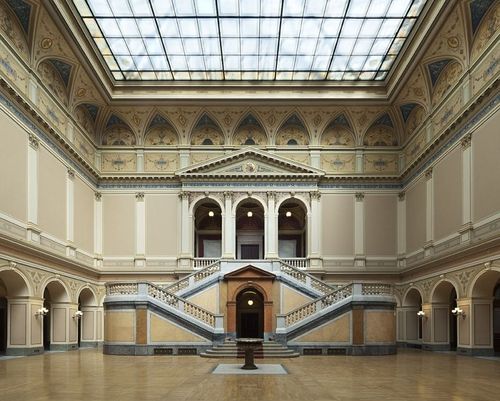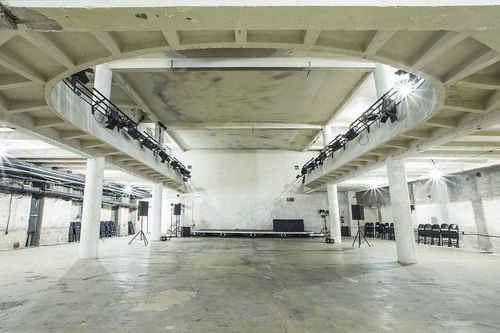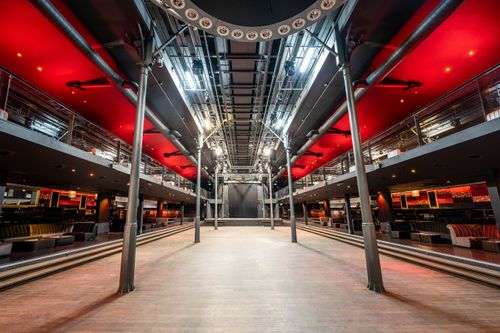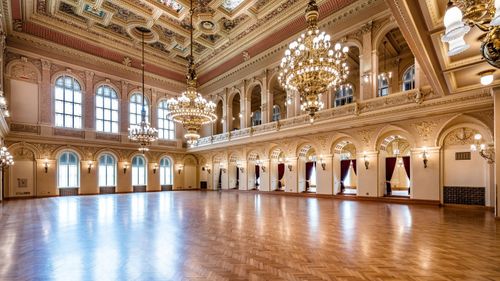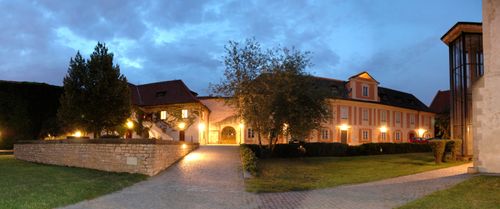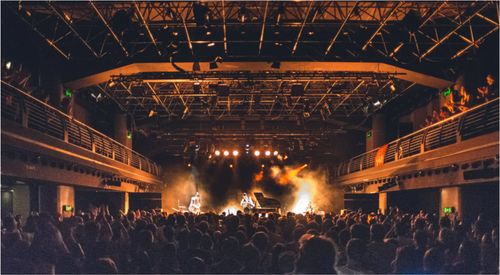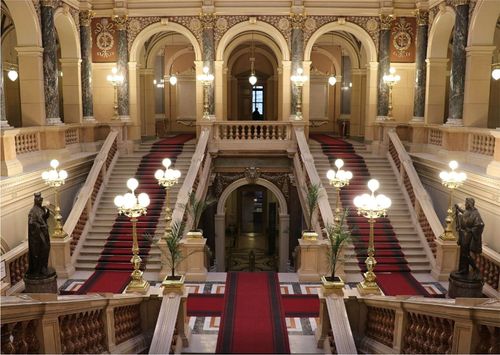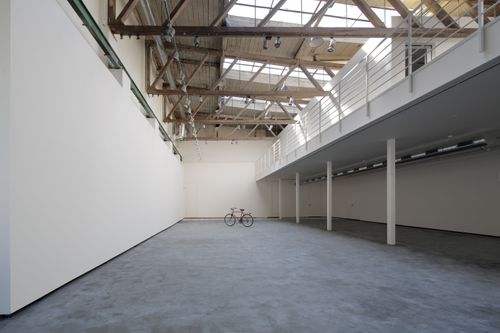Hire Conference Venues in Prague

Popular Conference Venues in Prague
Find unique conference spaces in Prague
See AllMagnificent Art Nouveau Venue With Opulent Splendour for Impactful Events
Have you ever dreamed of hosting your event in a space that exudes timeless grandeur? This stunning Art Nouveau conference hall combines historical charm with modern amenities, making it one of the most unique event venues in Prague. With its intricate... Show More
Industrial Eclectic Loft With a Cosy Atmosphere for Dynamic Workshops
Tucked away in a converted industrial loft, this one-of-a-kind event space blends contemporary urban aesthetics with an inviting atmosphere. The venue features a striking open-plan layout with towering bookshelves filled with literary treasures, adding an... Show More
Grand Neo-Renaissance Hall With Opulent Interiors for Elegant Banquets
This hall is a testament to Neo-Renaissance architecture, offering an exquisite setting for prestigious events. Its elegant façade, adorned with intricate stonework and statues, opens up to an opulent interior, where soaring ceilings, detailed frescoes, and... Show More
Industrial-Chic Art Gallery for Elegant Receptions and Exhibitions
What if your next event unfolded within the walls of a revitalised historical gallery, where raw textures meet contemporary artistry? This industrial-chic venue, perched on the third floor, exudes an avant-garde aesthetic. Its exposed concrete walls, arched... Show More
Sunlit Soviet-Era Grandeur With Classical Design for Sophisticated Events
Can a conference room offer both grandeur and intimacy in perfect harmony? With its timeless classical design, this historical venue answers with an undeniable yes. Built in the 1950s, during the Soviet architectural period, the hall preserves its original... Show More
Sleek Glass-Enclosed Space With a Professional Ambience for Exclusive Gatherings
Have you ever envisioned a meeting space where modern elegance meets historical charm? This sophisticated venue, set within a revitalised former theatre, offers a one-of-a-kind event experience in Prague’s Old Town. Encased in floor-to-ceiling glass, it... Show More
Majestic Socialist Realist Hall With Opulent Chandeliers for Grand Conferences
Have you ever imagined your event unfolding in a luminous hall adorned with grand chandeliers, soaring ceilings, and elegant mid-century décor? This striking congress hall is designed in the Socialist Realist architectural style, offering a majestic yet... Show More
Industrial Glass Atrium With Courtyard Charm for Sophisticated Events
Wouldn’t your next event shine in an intimate yet industrial-chic setting? This unique outdoor event venue blends historic charm with modern elegance, offering a refined atmosphere for corporate gatherings, networking events, and product launches. Nestled... Show More
Futuristic Galactic Hub With Sci-Fi Aesthetics for Immersive Corporate Events
Have you ever imagined hosting an event in a space that feels straight out of a sci-fi adventure? This cutting-edge venue transports guests into an ultra-modern, futuristic realm with sleek geometric architecture and a high-tech atmosphere. It is dominated by... Show More
Elegant Glass-Enclosed Atrium for Scenic Private Luncheons
Nestled within an urban sanctuary, this glass-enclosed event space is a breathtaking fusion of contemporary architecture and biophilic design. The venue is a modernist marvel, embracing the principles of transparency and natural illumination. Featuring an... Show More
Opulent Soviet-Era Chamber for High-End Conferences and Meetings
Have you ever imagined hosting your corporate event in a venue steeped in history yet designed for modern success? This remarkable meeting room offers a rare fusion of socialist realism and vintage elegance, making it a unique backdrop for exclusive gatherings... Show More
Raw Industrial Underground Theatre for Immersive Exhibitions
Tucked away beneath the city's streets, this underground theatre is a raw and atmospheric space that embraces the aesthetics of industrial brutalism. Exposed concrete pillars, worn floors, and visible piping create an unfiltered, edgy ambience that makes it a... Show More
Futuristic Industrial Club With a Bold Edge for High-Energy Launch Events
Set in a vast industrial space with a contemporary edge, this club is a bold fusion of raw metal structures, sleek glass panels, and moody lighting. Its architecture is rooted in industrial modernism, blending steel columns, exposed beams, and an open-plan... Show More
Grand Neoclassical Ballroom With Regal Charm for Exquisite Galas
Step into a world of timeless grandeur in this exquisite neoclassical ballroom, where opulence and history converge to create an unparalleled event setting. Designed in the 19th-century European neoclassical style, the venue boasts soaring ceilings adorned... Show More
Gothic Cloister With Enchanting Gardens for Timeless Celebrations
Nestled in the heart of the city, this awe-inspiring venue is a stunning fusion of medieval Gothic architecture and serene courtyard gardens, offering an atmosphere steeped in history and grandeur. Originally part of a monastic complex, the venue’s main event... Show More
Grand Renaissance Palace With Frescoed Interiors for Elegant Soirees
This breathtaking Renaissance palace is a true architectural masterpiece. A fusion of history and grandeur, it boasts meticulously preserved frescoed walls, intricate sgraffito detailing, and magnificent painted beam ceilings. Originally constructed in stages... Show More
Art Deco Hall With a Unique Astronomical Clock for Prestigious Receptions
This Art Deco-inspired venue blends historic grandeur with contemporary refinement, creating an elegant space ideal for corporate events. Its defining feature is the panoramic city view, framed by floor-to-ceiling windows that bathe the interior in natural... Show More
Industrial Concert Hall With Cutting-Edge Technology for Tech Summits
This striking industrial-style hall is a dynamic space designed for large-scale concerts, theatrical performances, and corporate events. The architecture blends raw industrial elements with high-end production capabilities, featuring exposed metal beams, a... Show More
Majestic Neo-Renaissance Complex With Grand Interiors for Exclusive Exhibitions
This glorious museum in Prague, located in the heart of the Czech capital, is a magnificent institution that encapsulates the rich cultural and historical heritage of the Czech Republic. With a history dating back to the early 19th century, the museum is not... Show More
An Industrial Gallery With Minimalist Aesthetic for Exhibitions and Creative Events
This industrial gallery is a stunning blend of historical character and modern minimalism. The exterior, with its muted grey and white tones, hints at its industrial past while maintaining a sophisticated simplicity. Inside, you are greeted with a vast,... Show More

A Guide to Renting Conference Venues in Prague
Hello, lovely event planners! We hear you’re gearing up to host a conference in Prague. Exciting times! This guide to hosting a conference in Prague couldn’t have come at a better time.
Read on to get all the inside scoop to help you navigate the picturesque streets, find the best venues, and create unforgettable experiences for your attendees. Let's turn your conference dreams into reality.
1) Identify the Ideal Conference Venue Style for Your Event.
Okay, so the first rule of hiring conference venuesin Prague is that aesthetics matter! Well, you have nothing to worry about there because this city spoils you for choice with its different styles of conference venues.
1. Historical venues: Fancy stuff first! Prague is a dream come true when it comes to historical venues. We're talking about chateaus and palaces straight out of fairytales.
Here, you get the chance to host your conference in a place steeped in history. We’re talking about features like ancient walls, intricate designs, and gardens that look like a movie set.
If you want your conference in Prague to feel like a royal affair, this is the way to go. Your attendees will practically be walking through history while discussing the future! How cool is that?
2. Industrial spaces: Unsurprisingly, this trend has also taken Prague by storm. Hosting a conference at an industrial venue combines the charm of a bygone era with a modern, avant-garde ambience.
In Prague, former warehouses and factories are transformed into dynamic venues perfect for conferences that want to make a statement. These spaces offer a departure from the traditional and serve as a blank canvas, allowing event planners to craft immersive experiences.
Whether you're hosting a tech summit, a product launch, or a creative workshop, these industrial venues can be tailored to suit your needs perfectly.
3. Meeting rooms and boardrooms: Now, these might sound ordinary, but trust us, in this city, even the ordinary becomes extraordinary.
In Prague, hosting conferences in meeting rooms and boardrooms isn't just business as usual. These spaces transform into vibrant productivity hubs infused with Prague's signature allure. They're far from ordinary and brim with cosy charm.
Decked out with all the essentials for a top-notch conference – plush seating, state-of-the-art tech, and that crucial dash of natural light – these rooms are designed to captivate and engage. Because who doesn't appreciate a sunlit boost during a meeting?
4. Contemporary venues: Step into Prague's modern era with its chic contemporary venues, rapidly becoming the top pick for conferencegoers. Dive into spaces dripping in sleek aesthetics, oozing minimalist elegance, and brimming with urban finesse. It's where modern artistry seamlessly integrates with next-gen tech. Want your conference to resonate with innovation? Let Prague's contemporary spaces elevate it to new heights!
5. Cultural centres: Prague's rich academic and cultural scene means that cultural centres often double up as conference venues for hire in Prague.
These spaces often have auditoriums, lecture halls, and exhibition areas, ideal for educational or artistic events. Plus, they often come with a scholarly ambience that can elevate the intellectual atmosphere of your conference.
Bonus Reading: Now that you know the different styles of conference venues in Prague, further research by checking out these cool exhibition venues in Prague.
2) The Best Areas for Hosting a Conference in Prague
There’s no denying that Prague is the ultimate blend of cool, convenient, and charming Seriously, no matter which part of the city you pick for your conference in Prague, prepare to be completely blown away.
But since we’re here to make your life easier, here are a few neighbourhoods that are a hot favourite.
1. Smíchov: This chill neighbourhood is located near the Vltava River. If you’re looking for cool conference venues in Prague, including modern event centres and slick hotels, Smíchov is where you’ll find them.
The best part about this neighbourhood is its laid-back vibe and entertainment options give you plenty of choices if you’re planning a side event or after-work for your conference attendees.
2. Holešovice: If you’re all about innovation and setting trends, you’ll love this up-and-coming neighbourhood, which has undergone significant development over the years.
Over here, you’ll find a mix of contemporary event venues and cultural spaces for hosting conferences and other events.
3. Vinohrady: Conversely, if you prefer a classic and tried-and-tested space, Vinohrady will not disappoint you.
This popular neighbourhood is known for its elegant atmosphere and green streets. Not only that, it is also home to several conference spaces in Prague, including hotels, and restaurants which are perfect for a post-conference get-together.
4. Karlin: Last but not least, we have what some consider to be Prague’s trendiest neighbourhood. You know you’ll attract the right crowd when you host your conference in Karlin.
Over here, you’ll find numerous conference venues, chic restaurants, and hip hotels that come with a modern backdrop (perfect for accommodation and after-work events)
Oh, and it’s also well-connected to the city centre, making it easy for everyone to commute.
Bonus reading: To check out other amazing neighbourhoods, here’s our guide on the best areas in Prague for hosting events.
3) What's the Cost of Hiring a Conference Space in Prague?
Navigating the maze of conference budgeting? We feel you! But here's the silver lining: Prague offers conference spaces to fit any wallet size. Whether you're pinching pennies or going all out, the city's diverse venues ensure you won't have to compromise on quality. Secure your ideal spot without burning a hole in your pocket!
- Basic conference venues: These typically range from €50 to €150 per hour, offering essential amenities ideal for small meetings or brief workshops.
- Mid-range conference spaces: Expect to budget between €150 to €350 per hour for venues providing additional amenities like audiovisual equipment and catering options suitable for larger meetings or half-day events.
- Premium conference venues: With costs ranging from €400 to €1000 or more per hour, these venues boast top-notch facilities, elegant decor, high-quality catering, and comprehensive event services, perfect for upscale and high-profile conferences.
You may want to consider additional costs such as:
- Audiovisual Equipment: The budget for audiovisual equipment can range from €500 to €2000 or more, depending on the complexity and scale of the equipment needed for presentations, sound systems, and live streaming.
- Catering: Plan to budget around €20 to €70 per person for catering services. This estimate includes meals, beverages, snacks, and possibly additional services like waitstaff and special dietary options.
- Materials and supplies: Allocate around €300 to €1000 for materials and supplies, covering items such as badges, printed materials, stationery, and decorations.
- Staff and services: The budget for staff and services, including event planners, coordinators, and support staff, can range from €500 to €2000 or more, depending on the level of expertise and assistance required.
- Marketing and promotion: Marketing and promotional activities might require a budget of €300 to €1500, covering online ads, printed materials, social media promotions, and other marketing strategies.
- Transportation and accommodation: Budget around €1000 to €5000 or more for transportation and accommodation of speakers or attendees, depending on the number of participants and their travel requirements.
- Insurance: Insurance costs can vary widely based on coverage needs. Budget between €200 to €1000 for conference insurance to protect against unforeseen circumstances and liabilities.
4) The Best Catering for Your Conference Space in Prague
Next up, let’s talk about everyone’s favourite topic, food! The good news is, that catering for your conference venue in Prague will be a delicious affair. However, the bad news is that with so many yummy things to choose from, it might be a tad hard to narrow down on the perfect menu.
Not to worry, here are some fantastic event caterers who can help you out!
1. Bohemian Catering: When it comes to traditional Czech cuisine, Bohemian Catering is a master. They serve up classics like svíčková (marinated sirloin), trdelník (sweet pastry), and palačinky (pancakes) with a modern twist.
It’s the perfect way to add a local touch to your conference in Prague.
2. Taste of Prague Catering: This much-loved event caterer in Prague brings the taste of the city to your conference. They specialise in fusion delicacies, blending local flavours with international twists.
We especially recommend their duck confit burger" and poppy seed strudel.
3. La Petit Chef: If you want to give your conference attendees a fine dining experience, La Petit Chef can help you create it.
With signature dishes like beef tenderloin medallions and chocolate fondant, these are the go-to caterers to elevate your conference to a gourmet affair.
4. Food Harmony: Everyone is on a health kick these days and if you’re catering to health-conscious conference attendees, we recommend checking out Food Harmony. They offer a diverse menu with a focus on healthy options.
From refreshing salads to creative vegetarian dishes like stuffed bell peppers, they ensure there's something delightful for every dietary preference.
5. Prague Party Food: Prague Party Food is your answer if you're looking for finger foods and creative snacks.
Their mini quiches and caprese skewers are visually appealing and incredibly flavourful, perfect for mingling and networking events.
Pro-tip: If you’ve got some time while you’re in Prague, try out the local cuisine at one of these top restaurants in Prague to dine with your team. It’ll help you get the city's flavour and plan a better event catering menu.
5) Amazing Breakout Ideas for Your Conference in Prague
Ready to leave a lasting impression? Dive into our standout breakout ideas for your Prague conference venue. These innovative concepts will elevate your event and have attendees buzzing long after the curtains fall. Time to make conference history!
1. Tech playground: Turn your conference venue for rent in Prague into a techie’s paradise. Picture this: a cutting-edge playground with mind-blowing virtual reality experiences, interactive demos, and the sleekest futuristic gadgets. It is time to unleash the inner techie in all!
2. Team-building activities: Incorporating team-building activities during breaks can give meeting attendees time to bond and collaborate.
- Bonus reading: For more team-bonding ideas, we’ve put together the 6 best team activities in Prague that you can consider.
3. Mindfulness and relaxation sessions: Amidst the conference hustle, offer attendees a chance to unwind with mindfulness and relaxation workshops.
Host a quick yoga session or bring in local spa experts for short relaxation treatments. It’s a rejuvenating way to ensure your attendees leave the conference feeling refreshed and inspired.
4. Art and craft workshops: Tap into Prague’s artistic atmosphere by organising art and craft workshops.
Invite local artists to guide attendees in creating traditional Czech crafts like glass beads or marionettes. It’s a creative way to foster team collaboration while indulging in Prague's artistic heritage.
6) After-work Ideas for a Conference in Prague
Bid farewell to the post-conference blues with these fantastic after-work ideas that will elevate your networking experience beyond the confines of your conference venue in Prague.
- Culinary tour: Gather your conference attendees and go on a gastronomic adventure with a food-tasting tour through Prague’s famous eateries that offer you a combination of traditional Czech flavours and international delights.
- Prague River Cruise: Set sail on the Vltava River with a conference cruise, offering networking opportunities amidst the city’s gorgeous views.
- Czech beer tasting: When in Prague, enjoy beer as the locals do! Arrange a beer-tasting session featuring a variety of Czech beers. Experts can guide attendees through the rich history and brewing techniques, making it an educational yet incredibly enjoyable experience.
- Prague ghost tour: Host a ghost tour in Prague's historic district for something unique and entertaining. Professional guides share spooky tales and legends, adding a thrilling twist to post-conference activities.
- Prague Castle Sunset Tour: Organise a guided tour to Prague Castle during the golden hours. Watch the sunset over the city's iconic castle, providing a breathtaking backdrop for networking and casual conversations.
Wrapping Up
And just like that, we’ve ended our guide to hosting a conference in Prague. We’ve shared with you everything you need to host the next best conference. Be sure to use our Ask Expert function if you need further assistance.

FAQs about Prague Conference Venues
The best time to book a conference space in Prague depends on your specific requirements and preferences. However, generally speaking, the best time to book a conference space in Prague is during the shoulder seasons: spring (April to June) and autumn (September to October).
During these months, the weather in Prague is relatively mild and pleasant, making it comfortable for attendees to explore the city. Additionally, these periods are not peak tourist seasons, so you might find more options and potentially lower prices for conference venues and accommodations.
It's essential to consider major events and holidays in Prague that might affect venue availability and rates. Booking well in advance, regardless of the time of year, ensures that you secure your desired conference space and get the best possible arrangements for your event.
Prague offers ample support to make your conference sustainable. Many venues, hotels, and service providers in the city are embracing eco-friendly practices. From venues implementing energy-efficient solutions and waste reduction programs to hotels obtaining certifications like Green Key or EarthCheck for their environmental efforts, you have various options.
When it comes to catering, numerous companies in Prague prioritize locally sourced and organic ingredients, ensuring your attendees enjoy sustainable meals.
Additionally, Prague boasts an efficient public transportation system, making it easy for attendees to use eco-friendly means of travel. Encouraging the use of public transport can significantly reduce the event's carbon footprint.
When seeking local sponsors for your conference in Prague, consider collaborating with organisations like the Prague Chamber of Commerce, StartupYard, or Impact Hub Prague.
These entities have a vested interest in supporting local events and businesses. Craft a compelling sponsorship proposal tailored to each potential sponsor, emphasising the specific benefits they could gain, such as exposure to a targeted audience or networking opportunities with industry leaders.
Engage with them personally, attending local business events and networking meetups, often providing a platform to connect with potential sponsors face-to-face. Building a strong rapport, understanding their goals, and showing how your conference aligns with their mission can greatly enhance your chances of securing local sponsors.
Remember, it's not just about what they can do for your conference, but also what your conference can do for them and the local community.
Eventbrite is a widely recognised platform that allows you to create and customise your event page, sell tickets, and manage registrations efficiently.
Ticketportal is another prominent platform, particularly popular in the Czech Republic, offering comprehensive ticketing solutions for various events, including conferences. GoOut is a user-friendly platform utilised for selling tickets to cultural and entertainment events, often used by conference organizers in Prague.
Additionally, Meetup, although primarily a platform for creating and building communities, also allows event organizers to sell tickets and manage registrations for conferences and similar events.
Getting to your conference venue in Prague is convenient and efficient, thanks to the city's well-developed public transportation system. Encourage your attendees to use the Prague Metro, trams, and buses, which cover most parts of the city.
The Metro, consisting of three lines (A, B, and C), is the fastest way to navigate Prague. Trams and buses are also plentiful and can take attendees to various destinations. Additionally, Prague is a walkable city, and many conference venues are located within reasonable distances from major hotels and popular neighbourhoods.
Taxis and rideshare services like Uber are readily available for those preferring a more direct and private transportation option. Make sure to provide clear instructions and maps to attendees, indicating the nearest public transportation stops and stations, enabling them to reach the conference venue hassle-free.
For your conference in Prague, there are several language considerations to keep in mind. While English is widely understood, especially in business and tourism sectors, it's respectful to acknowledge the local language, Czech.
Consider having essential conference materials, such as programs, signage, and important announcements, available in both English and Czech. If you have a significant number of attendees from non-English speaking countries, you might also want to consider translations into other relevant languages.
When hiring local staff or interpreters, ensure they are proficient in both English and Czech. During presentations or speeches, speakers should speak clearly and avoid using idiomatic expressions that might be challenging for non-native English speakers to understand. Being sensitive to the diverse linguistic backgrounds of your attendees enhances their conference experience and fosters a more inclusive environment.


